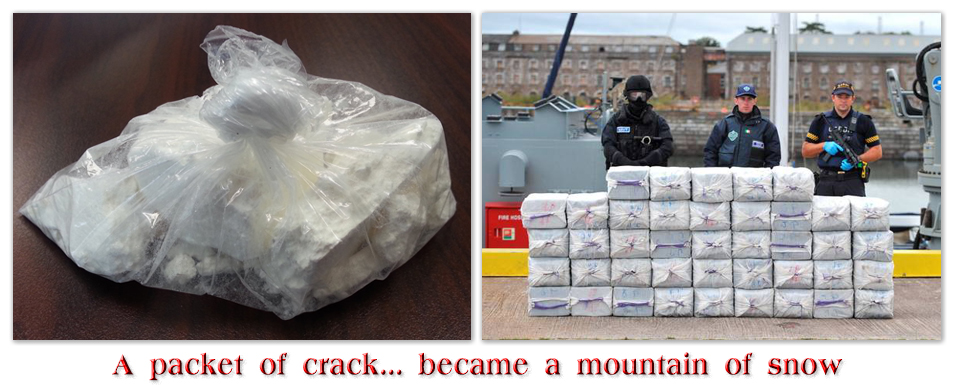We post news and comment on federal criminal justice issues, focused primarily on trial and post-conviction matters, legislative initiatives, and sentencing issues.

ANOTHER CIRCUIT HOLDS FSA RESENTENCING DEPENDS ON FACTS IN INDICTMENT, NOT IN THE PSR
The tide is slowly turning in favor of defendants for crack cocaine resentencings arising from Fair Sentencing Act (FSA) retroactivity, authorized a year ago (minus five days) in Section 404 of the First Step Act. A few weeks ago, the 4th Circuit held that eligibility for a sentence reduction depended on the amount of crack specified in the indictment, not what the court found at sentencing. Last week, the 8th Circuit reached a similar conclusion where the defendant had been charged with 50 grams of crack, but sentenced for 150 kilos of powder.
Back before the turn of the millennium, Maurice McDonald was charged with distributing more than 50 grams of crack, and convicted of distributing about 57 grams of cocaine base. When Maurice committed the offense in 1999, the statutory penalty for 57 grams of crack was 10 years to life in prison. He was sentenced to life in prison, but that was cut to 30 years in a prior Guidelines 2-level reduction. After First Step made the FSA retroactive, the statutory range for Maurice’s conviction fell to 5 to 40 years.
But the district court denied Maurice’s sentence reduction motion, because his 360 month-to-life Guidelines sentencing rang was based on the presentence report’s having found him responsible for distributing more than 150 kilos of powder cocaine. Because his sentence was driven by the 330 lbs. of powder described in the PSR, the district judge reasoned, Maurice was not eligible for a reduction under the retroactive FSA.
The 8th Circuit disagreed. Instead, it held, Maurice’s offense of conviction is a “covered offense” under First Step Act Sec. 404 because (1) it is a violation of a federal statute specifying crack cocain; (2) the statutory penalties for that statute were modified by the FSA; and (3) the offense was committed before August 3, 2010. Consequently, Maurice was eligible for a sentence reduction on his count of conviction.
 The 8th wrote, “It is true, as the district court noted, that McDonald’s base offense level under the Sentencing Guidelines was based on more than 150 kilograms of powder cocaine, not cocaine base. But this Guidelines calculation does not change the fact that he was convicted… for distributing cocaine base in violation of 21 USC 841(b)(1)(A)(iii). The First Step Act applies to offenses, not conduct… and it is McDonald’s statute of conviction that determines his eligibility for relief.”
The 8th wrote, “It is true, as the district court noted, that McDonald’s base offense level under the Sentencing Guidelines was based on more than 150 kilograms of powder cocaine, not cocaine base. But this Guidelines calculation does not change the fact that he was convicted… for distributing cocaine base in violation of 21 USC 841(b)(1)(A)(iii). The First Step Act applies to offenses, not conduct… and it is McDonald’s statute of conviction that determines his eligibility for relief.”
The Circuit explained that a district court considering a motion for reduced crack sentence under the First Step Act “proceeds in two steps. First, the court must decide whether the defendant is eligible for relief under Sec. 404. Second, if the defendant is eligible, the court must decide, in its discretion, whether to grant a reduction. That the court might properly deny relief at the discretionary second step does not remedy any error in determining ineligibility at the first step.”
 In a recent Southern District of Texas case, a district court denied a defendant a First Step Sec. 404 sentence reduction because of the weight of the crack found in the PSR, rather than what was alleged in the indictment. The defendant moved for reconsideration, explaining in detail that the weight of authority nationwide is trending in the direction of holding that it is the indictment, not the PSR, that governs eligibility for a sentence reduction.
In a recent Southern District of Texas case, a district court denied a defendant a First Step Sec. 404 sentence reduction because of the weight of the crack found in the PSR, rather than what was alleged in the indictment. The defendant moved for reconsideration, explaining in detail that the weight of authority nationwide is trending in the direction of holding that it is the indictment, not the PSR, that governs eligibility for a sentence reduction.
Remarkably, the district court conceded the point, holding that “in the interest of justice and a spirit of ‘judicial comity’, the Court follows the majority of courts that have addressed this issue, determining that the eligibility under Sec. 404(a) turns on the offense not the defendant’s conduct. Therefore, the defendant’s motion for reconsideration is granted, finding that he is eligible for a reduced sentence under the Fair Sentencing Act.”
United States v. McDonald, 2019 U.S. App. LEXIS 36661 (8th Cir. Dec. 11, 2019)
United States v. Steptoe, Case No. 4:02-CR-688 (SD Tex., Nov. 6, 2019)
– Thomas L. Root


